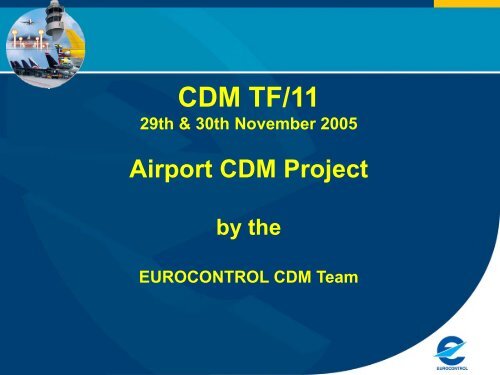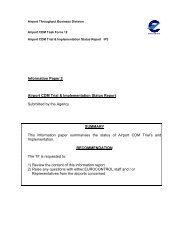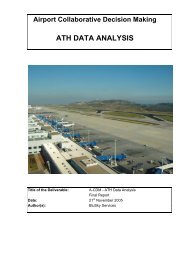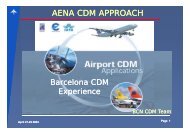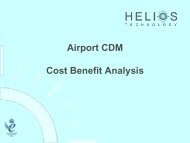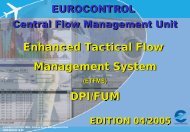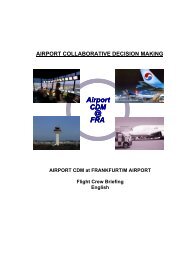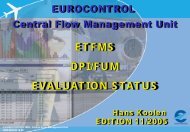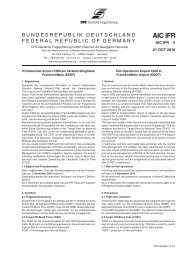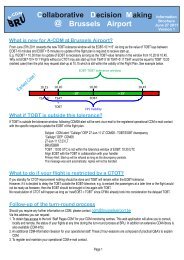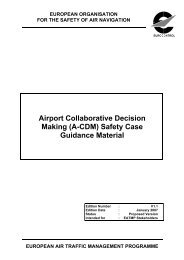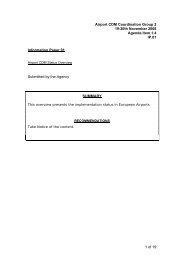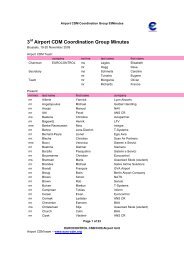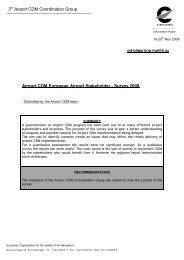Presentation Eurocontrol CDM Project - Airport Collaborative ...
Presentation Eurocontrol CDM Project - Airport Collaborative ...
Presentation Eurocontrol CDM Project - Airport Collaborative ...
You also want an ePaper? Increase the reach of your titles
YUMPU automatically turns print PDFs into web optimized ePapers that Google loves.
<strong>CDM</strong> TF/11<br />
29th & 30th November 2005<br />
<strong>Airport</strong> <strong>CDM</strong> <strong>Project</strong><br />
by the<br />
EUROCONTROL <strong>CDM</strong> Team
<strong>Airport</strong> <strong>CDM</strong> <strong>Project</strong><br />
<strong>Airport</strong> <strong>CDM</strong> <strong>Project</strong><br />
Frequent Asked Questions<br />
(Elisabeth Lagios - <strong>Airport</strong> <strong>CDM</strong> <strong>Project</strong> Manager)
<strong>Airport</strong> <strong>CDM</strong> <strong>Project</strong><br />
Frequently Asked Questions (FaQ) – IP2<br />
General – Information Sharing, Turn-round<br />
procedures and VTTTs - were based on <strong>CDM</strong> TF/9 &<br />
10 WG Conclusions<br />
FUM / DPI <strong>Collaborative</strong> Management of Flight<br />
Updates – Current <strong>Airport</strong> Trials & <strong>CDM</strong> TF/12 WG in<br />
May 2006<br />
<strong>CDM</strong> in Adverse Conditions & Predepature<br />
Sequencing – will be based on <strong>CDM</strong> TF/9-11<br />
Conclusions and for inclusion in Implementation<br />
Manual by June 2006
<strong>Airport</strong> <strong>CDM</strong> <strong>Project</strong><br />
<strong>Airport</strong> <strong>CDM</strong> <strong>Project</strong><br />
<strong>Airport</strong> <strong>CDM</strong> Level 3<br />
OCD & FRD<br />
(Roger Lane – EEC <strong>Airport</strong> <strong>CDM</strong> <strong>Project</strong> Manager)
<strong>Airport</strong> <strong>CDM</strong> <strong>Project</strong><br />
<strong>CDM</strong> LEVEL 3 - (COLLABORATIVE PREDEPARTURE<br />
SEQUENCE AND <strong>CDM</strong> IN ADVERSE CONDITIONS) IP3<br />
Operational Concept / Functional Requirement Documents<br />
OCDs discussed/reviewed in subgroup at Task Force 10.<br />
Revised version sent to a limited group of TF members for<br />
further review prior to a final internal review.<br />
FRDs were drafted once the OCDs were completed and had<br />
been internally reviewed.<br />
The documents will now be included in the main OCD/FRD<br />
documents – which in turn will be used to produce an update of<br />
the <strong>CDM</strong> Implementation Manual in July 2006
<strong>Airport</strong> <strong>CDM</strong> <strong>Project</strong><br />
<strong>Airport</strong> <strong>CDM</strong> <strong>Project</strong><br />
Cost & Benefit Analysis<br />
(Maria Christina Meyer - <strong>Airport</strong> <strong>CDM</strong> <strong>Project</strong> team)
First CBA available<br />
Progress Report - <strong>Airport</strong> <strong>CDM</strong> <strong>Project</strong> CBA<br />
Current Status:<br />
Scope: <strong>Airport</strong> <strong>CDM</strong> Level 1 applications<br />
<strong>Airport</strong> Information Sharing<br />
Turn-Round Processes<br />
You can find the final CBA report at<br />
our website: www.euro-cdm.org<br />
What are the next steps?
Progress Report - <strong>Airport</strong> <strong>CDM</strong> <strong>Project</strong> CBA<br />
Develop and deliver in 2006:<br />
Next Steps:<br />
CBA for Level 2 / 3 applications<br />
<strong>Collaborative</strong> Management of Flight Updates<br />
Variable Taxi-Time Calculations<br />
<strong>Collaborative</strong> Predeparture Sequence based on<br />
Preferences<br />
<strong>CDM</strong> in Adverse Conditions<br />
Consolidated <strong>Airport</strong> <strong>CDM</strong> CBA including<br />
results for Level 1 / 2 / 3 applications<br />
External sub-contractor selection process currently in its<br />
final phase
Challenges:<br />
Uncertainties<br />
Many airport profiles<br />
Different nature of airport<br />
problems and eventual <strong>CDM</strong><br />
benefits<br />
Many stakeholder groups involved<br />
Double counting avoidance<br />
Confidentiality of data<br />
Use lessons learnt from first CBA<br />
Take advantage of the maturity<br />
obtained in past years<br />
Progress Report - <strong>Airport</strong> <strong>CDM</strong> <strong>Project</strong> CBA<br />
Critical Success Factors:<br />
Transparency of CBA process:<br />
it should be clear « how » results are<br />
achieved<br />
Each stakeholder group should get a<br />
clear view on their own individual<br />
costs & benefits<br />
Results presented should be<br />
comprehensive and user friendly<br />
Stakeholders involvement from the<br />
beginning and throughout the<br />
complete process
Progress Report - <strong>Airport</strong> <strong>CDM</strong> <strong>Project</strong> CBA<br />
Objectives:<br />
Provide a robust and reliable « tool » to support<br />
decisions on further investments<br />
Provide good guidance to perform <strong>Airport</strong> <strong>CDM</strong><br />
CBA at local airport level using standard<br />
guidelines<br />
<strong>Airport</strong> <strong>CDM</strong> must be valued – This CBA should<br />
help!<br />
How will we achieve this?
Progress Report - <strong>Airport</strong> <strong>CDM</strong> <strong>Project</strong> CBA<br />
A New Approach:<br />
The quality of the process is key to obtain<br />
transparency<br />
<strong>Eurocontrol</strong> EMOSIA methodology will be followed:<br />
European MOdel for ATM Strategic Investment Analysis<br />
A standard approach, an structured methodology, a set of tools for<br />
Cost & Benefit Analysis<br />
Based on industry best practice and stakeholders’ contribution<br />
Applied to a number of EUROCONTROL and EC programmes,<br />
e.g. Link2000+, CASCADE, CAMES, C-ATM, SEAP,<br />
Nordic SWIM, SENSE
EMOSIA strengths:<br />
Progress Report - <strong>Airport</strong> <strong>CDM</strong> <strong>Project</strong> CBA<br />
A New Approach:<br />
Management of uncertainties (Risk Analysis)<br />
Focus on what really matters by identifying the most critical<br />
variables to success of the project<br />
(Sensitivity Analysis)<br />
Use of standard inputs (knowledge from past CBAs)<br />
Consistent, transparent and flexible<br />
The approach lends itself to working closely<br />
with stakeholders
Level 1 Level 2<br />
Level 3<br />
<strong>Airport</strong> <strong>CDM</strong> <strong>Project</strong><br />
<strong>Airport</strong> <strong>CDM</strong> Information Sharing<br />
CBA performed !<br />
Progress Report - <strong>Airport</strong> <strong>CDM</strong> <strong>Project</strong> CBA<br />
<strong>CDM</strong> Turn-round Process<br />
<strong>Collaborative</strong> Management of<br />
Flight Updates<br />
Variable Taxi Time Calculation<br />
<strong>Collaborative</strong> Predeparture<br />
Sequence<br />
<strong>CDM</strong> in Adverse Condition<br />
Stakeholders Involvement:<br />
Workshops, visits to airports, local data analysis and regular validations<br />
<strong>Airport</strong>s in general<br />
CBA Level 1<br />
Applications<br />
Generic<br />
CBA<br />
Generic<br />
CBA<br />
Generic<br />
CBA<br />
Generic<br />
CBA<br />
Generic CBA – all levels<br />
EMOSIA Methodology<br />
<strong>Airport</strong><br />
1 <strong>Airport</strong><br />
2<br />
Specific <strong>Airport</strong>s<br />
<strong>Airport</strong><br />
3<br />
Parallel activities during 2006<br />
<strong>Airport</strong><br />
4<br />
Site Specific<br />
CBAs<br />
Other<br />
<strong>Airport</strong>s<br />
(optional)
Standard framework<br />
definition to be used as a<br />
start-point for Site Specific<br />
CBAs<br />
Not directly dependent<br />
on data from<br />
local airport trials<br />
Stakeholders<br />
will be involved<br />
through workshops<br />
(trial airports<br />
and others)<br />
Top-down approach<br />
Progress Report - <strong>Airport</strong> <strong>CDM</strong> <strong>Project</strong> CBA<br />
Identify expectations,<br />
potential benefits<br />
and costs<br />
Qualify and quantify<br />
as much as possible<br />
Ensure<br />
uncertainties are<br />
well considered<br />
Based on<br />
expert judgement,<br />
experience,<br />
results from studies<br />
and from trials<br />
conducted so far<br />
Generic<br />
CBAs<br />
Results serve as<br />
validation for<br />
Generic CBAs<br />
Site<br />
Specific<br />
CBAs<br />
Local<br />
stakeholders<br />
will be involved<br />
through workshops ,<br />
data collection<br />
and<br />
analysis<br />
Evaluate<br />
local airport<br />
specific<br />
costs & benefits<br />
Local data is<br />
the main<br />
source of<br />
information<br />
We want<br />
to ensure diversity of<br />
airport profiles
Progress Report - <strong>Airport</strong> <strong>CDM</strong> <strong>Project</strong> CBA<br />
Planning & Milestones:<br />
Jan 2006 – Kick-off meeting with sub-contractor<br />
End Feb 2006 – Workshop Level 3 Applications Generic CBA<br />
Q1 2006 – Level 3 Applications Generic CBA<br />
Q2 2006 – Workshop Level 2 Applications Generic CBA<br />
Q2 2006 - Level 2 Applications Generic CBA<br />
Q3 2006 – Workshop for Consolidation of CBA results<br />
Q4 2006 – Generic CBA all levels<br />
<strong>Airport</strong>s interested to participate in Site Specific<br />
CBAs, please, contact Elisabeth Lagios or myself
<strong>Airport</strong> <strong>CDM</strong> <strong>Project</strong><br />
Strategic fit of <strong>Airport</strong> <strong>CDM</strong><br />
&<br />
OATA Architecture<br />
(Milen Detchev - OATA <strong>Project</strong> Manager)
Navigation<br />
Aids<br />
PSR,<br />
SSR<br />
Mode-S<br />
Radar<br />
CNS<br />
ADS<br />
Air<br />
Surveillance<br />
Aircraft<br />
Navigation<br />
Multilateration<br />
Ground<br />
Surveillance<br />
Air/Ground DL Services<br />
Pilot<br />
Aircraft<br />
Surveillance<br />
Aircraft<br />
Autonomous<br />
Sensors<br />
<strong>Airport</strong><br />
Surveillance<br />
Detection<br />
Equipment<br />
ADS - B<br />
OATA Clusters<br />
Executive & Planner<br />
Controller<br />
ACC Supervisor<br />
Multi Sector Planner<br />
Tactical Load Mng<br />
ATM<br />
En-route/APP<br />
ATC<br />
Flight<br />
Management<br />
Tower Ground<br />
Controller<br />
Tower Runway<br />
Controller<br />
Tower Supervisor<br />
Aerodrome<br />
ATC<br />
Aerodrome<br />
Shared<br />
Elements<br />
<strong>Airport</strong><br />
Operator<br />
<strong>Airport</strong><br />
Operations<br />
Airspace<br />
Shared<br />
Elements<br />
Pilot<br />
Aircraft<br />
Operator<br />
Airspace<br />
User<br />
Operations<br />
Communications and Distributed System Services<br />
Aircraft<br />
Shared<br />
Elements<br />
Flow<br />
Manager<br />
Network<br />
Manager<br />
ATFCM<br />
Shared Elements (Cross-Domain Modules)<br />
Meteo<br />
Service<br />
Provider<br />
Aeronautical<br />
Information<br />
Service<br />
Provider<br />
Airspace<br />
Manager<br />
Airspace<br />
Organisation &<br />
Management<br />
Meteo<br />
Shared<br />
Elements
Cross-Domain Modules<br />
(built in interoperability)<br />
Identification of data and functionality common to<br />
different ATM domains<br />
Ensure that everybody has the same information<br />
System-Wide Information Management (SWIM)<br />
Communicate updates immediately, everywhere<br />
Ensure data ownership rights, etc.<br />
Are not just data stores but provide services<br />
standardise the services that will access the shared data,<br />
rather than standardising the data, avoiding the risk that data will be<br />
used in a different way.<br />
Consequently everybody interprets the data in the same way
Flow Manager<br />
Network Manager<br />
Air Traffic<br />
Controllers<br />
Aeronautical<br />
Information<br />
Management<br />
Aeronautical<br />
Information<br />
Management<br />
Decision<br />
Support etc.<br />
Modules<br />
Use of Cross-Domain Modules<br />
Configuration<br />
Management<br />
Configuration<br />
Management<br />
Decision<br />
Support etc.<br />
Modules<br />
Flight<br />
Management<br />
Flight<br />
Management<br />
ATC Constraint<br />
Management<br />
Aircraft<br />
cross-domain synchronisation – common view shared by ATC and ATFCM<br />
Aircraft
ACC1<br />
ACC2<br />
ACC3<br />
Cross-Domain Module Specialisation<br />
ATC<br />
Common<br />
Core<br />
Specialisation<br />
CFMU/Brussels<br />
Common<br />
Core<br />
ATFCM<br />
Common<br />
Core<br />
Specialisation<br />
CFMU/Brétigny<br />
<strong>Airport</strong><br />
Common<br />
Core<br />
Specialisation<br />
<strong>Airport</strong> 2<br />
<strong>Airport</strong> 1
Levelling of Current Activities<br />
SWIM a Framework for all Requirements needed to be able to fulfil Operational<br />
Concepts like <strong>CDM</strong>, e.g. legal, institutional, business, organisational, operational and<br />
technical.<br />
<strong>CDM</strong>, part of the Operational Concept, who is co-operating with whom and which<br />
information is required to co-operate effectively.<br />
OATA Cross Domain Modules (SPECIFICATION), the information and corresponding<br />
services which will be shared.<br />
Level used by the ATM Developers of the other ATM functions (MTCD, Coordination and Transfer,<br />
Departure Management, Demand Capacity Balancing).<br />
They do not have to worry about geographical and system boundaries. The cross domain modules<br />
will take care, that they get the information they need in time, even when it is stored elsewhere.<br />
IMPLEMENTATION, two current directions for solutions<br />
FOIPS the implementation of the Flight Manager. Based on the Flight Manager Services, they will<br />
define the data to be shared and all requirements for that data sharing.<br />
For AIM the EAD is the centralised solution for data sharing, The XML based interface of the EAD<br />
will probably be used by the AIM cross domain modules to collect the iformation to provide the<br />
services to the AFTCM and ATC applications.<br />
Industry is looking at COTS mechanisms to support information sharing. (System and<br />
Middleware Support).<br />
Principles for Cross Domain Synchronisation addresses this level and investigates possible<br />
solutions based on Distributed Databases (Relational, OO and/or Real Time), CORBA and/or XML<br />
based publish/subscribe mechanism etc.
<strong>Airport</strong> <strong>CDM</strong> <strong>Project</strong><br />
<strong>Airport</strong> <strong>CDM</strong> <strong>Project</strong><br />
<strong>Airport</strong> <strong>CDM</strong> Training<br />
&<br />
Athens Data Analysis<br />
(Velissarios Eleftheriou - <strong>Airport</strong> <strong>CDM</strong> <strong>Project</strong> team)
<strong>Airport</strong> <strong>CDM</strong> <strong>Project</strong><br />
<strong>Airport</strong> <strong>CDM</strong> Training Course<br />
Free of charge (for AOP, AO, ATC, GH)<br />
2 successful courses in 2005<br />
IANS (Luxembourg): 17-19 May and Nov 2006<br />
Locally at <strong>Airport</strong>s: upon request (already LHR, BRU)<br />
Contact: velissarios.eleftheriou@eurocontrol.int
Athens <strong>Airport</strong> Data Analysis<br />
Busy Period 01 AUG – 15 SEPT 2004 (approx. 14,000 dep.)<br />
2004 Summer Olympic Games – Special procedures in place<br />
Data sets: local <strong>CDM</strong> Tool (not operational) and CFMU<br />
Objective: Predictability<br />
“… Predictability is of major importance in airline and airport<br />
scheduling. Cutting 5 min. off 50% of schedules would be worth<br />
some € 1000 million per annum in better use of airline & airport<br />
resources...” PRR 8<br />
Report on www.euro-cdm.org<br />
<strong>Airport</strong> <strong>CDM</strong> <strong>Project</strong>
<strong>Airport</strong> <strong>CDM</strong> <strong>Project</strong><br />
Athens <strong>Airport</strong> Data Analysis
<strong>Airport</strong> <strong>CDM</strong> <strong>Project</strong><br />
Athens <strong>Airport</strong> Data Analysis<br />
• Local Data – flights with actual delay 30-60 min.<br />
• <strong>CDM</strong> warning 1-5 hrs in advance for 77.5% of these flights
<strong>Airport</strong> <strong>CDM</strong> <strong>Project</strong><br />
Athens <strong>Airport</strong> Data Analysis<br />
• Local Data – flights with actual delay 60-90 min.<br />
• <strong>CDM</strong> warning 1-5 hrs in advance for 75.9% of these flights
<strong>Airport</strong> <strong>CDM</strong> <strong>Project</strong><br />
Athens <strong>Airport</strong> Data Analysis<br />
• Comparing CFMU & Local Data – flights with DLA msg<br />
• <strong>CDM</strong> warning before the DLA was sent for 71.9% of them
<strong>Airport</strong> <strong>CDM</strong> <strong>Project</strong><br />
Athens <strong>Airport</strong> Data Analysis<br />
• CFMU vs Local Data – flights with actual delay > 15 min<br />
• Left: Flights without a DLA msg 44.7%<br />
• Right: Flights with <strong>CDM</strong> warning 73.7%
<strong>Airport</strong> <strong>CDM</strong> <strong>Project</strong><br />
Athens <strong>Airport</strong> Data Analysis<br />
• Comparing CFMU & Local Data – flights missing their CTOT<br />
• <strong>CDM</strong> warning for 72% of them
<strong>Airport</strong> <strong>CDM</strong> <strong>Project</strong><br />
DMAN & <strong>CDM</strong><br />
(Volker Huck – DMAN <strong>Project</strong> Manager)
DMAN & <strong>CDM</strong> - History<br />
<strong>Airport</strong> <strong>CDM</strong> <strong>Project</strong><br />
DMAN was in ASA (Automated Support to ATS) project<br />
ASA projects’ life-cycle: Initiation, Development, Validation >><br />
Deliverables included validated OCD / ORD<br />
DMAN is half through validation, that means nearly finished<br />
ASA dissolved >> <strong>Project</strong>s now in TMA2010+ and FASTI (Fast<br />
Implementation)<br />
DMAN split between TMA2010+ (adv. DMAN) and airport <strong>CDM</strong><br />
(basic DMAN)
<strong>Airport</strong> <strong>CDM</strong> <strong>Project</strong><br />
DMAN & <strong>CDM</strong> – Basic vs Advanced DMAN<br />
Basic DMAN translates ready push-start into availability at RWY<br />
with tables. Then creates a good sequence and delivers MTOT<br />
and MOBT.<br />
Basic DMAN is in final stages of validation<br />
Adv DMAN (now called “Departure Metering”) works on airport<br />
clusters and tries to avoid uneven loading of exit fixes, probably<br />
with “mini-slots”<br />
Departure Metering is between initiation phase and development<br />
Both functions can and shall work together and independently<br />
Basic DMAN >> airport <strong>CDM</strong><br />
Adv DMAN >> TMA2010+
DMAN & <strong>CDM</strong> - Validation<br />
<strong>Airport</strong> <strong>CDM</strong> <strong>Project</strong><br />
Fast time simulations: Executed on two sequencers, based on<br />
traffic observations at EBBR, EGLL, EGKK, LEMD, LOWW.<br />
Measured: throughput, slot-compliance, predictability,<br />
environment.<br />
Impact: Done<br />
Real time simulations: RTS1, RTS2, RTS3 on ESSA (5 weeks<br />
total), part of G2G.<br />
Measured: controller acceptance, workload, throughput,<br />
environment<br />
Impact: Nearly done
DMAN & <strong>CDM</strong> – Field Trials<br />
EBBR and maybe more...<br />
<strong>Airport</strong> <strong>CDM</strong> <strong>Project</strong><br />
Initial set-up at EBBR: life, but needs improvement on the<br />
interface to the AMS (ATC) system<br />
Objectives:<br />
Integration into <strong>Airport</strong> <strong>CDM</strong> procedures<br />
Automatic generation of A-DPI<br />
Implementation support (guidance, performance standards,<br />
simulations)<br />
<strong>Airport</strong> specific and traffic specific benefit assessment<br />
Implementation incentives? (some benefits x-feed to downstream<br />
units, dest. airports and CFMU)
<strong>Airport</strong> <strong>CDM</strong> <strong>Project</strong><br />
<strong>Airport</strong> <strong>CDM</strong> <strong>Project</strong><br />
Implementation Manual, Distribution & Updates<br />
(Dave Booth - <strong>Airport</strong> <strong>CDM</strong> <strong>Project</strong> team)
<strong>Airport</strong> <strong>CDM</strong> <strong>Project</strong><br />
Implementation Manual, Distribution & Updates<br />
Distribution Status:<br />
150 Manuals distributed so far<br />
On going distribution to Airlines (organised in close<br />
collaboration with IATA)<br />
On going coordination with ACI EUROPE for distribution<br />
to airports (Raising Awareness of <strong>CDM</strong> at <strong>Airport</strong>s)
<strong>Airport</strong> <strong>CDM</strong> <strong>Project</strong><br />
Implementation Manual, Distribution & Updates<br />
Updates Planning:<br />
Version 2 – Q1 2006<br />
Generic MOU to be added<br />
FAQ to be added<br />
Updated List of Acronyms<br />
KPI’s Guidelines<br />
New Animations CD<br />
Any sample documents
<strong>Airport</strong> <strong>CDM</strong> <strong>Project</strong><br />
Implementation Manual, Distribution & Updates<br />
Updates Planning:<br />
Version 3 – Q3 2006<br />
Level 3 Applications<br />
Generic Procedures<br />
CBA Guidelines<br />
Version 4 – Q4 2006 (Optional)
<strong>Airport</strong> <strong>CDM</strong> <strong>Project</strong><br />
<strong>Airport</strong> <strong>CDM</strong> <strong>Project</strong><br />
Raising Awareness<br />
&<br />
Promoting <strong>CDM</strong> Implementation<br />
at <strong>Airport</strong>s<br />
(Dave Hogg - <strong>Airport</strong> <strong>CDM</strong> <strong>Project</strong> team)
Raising Awareness & Promoting <strong>CDM</strong><br />
Implementation at <strong>Airport</strong>s<br />
The roll out <strong>CDM</strong> Implementation at <strong>Airport</strong>s:<br />
30+ <strong>Airport</strong>s 2006 – CODA List of critical <strong>Airport</strong>s 2005<br />
Standard cycle applied:<br />
Convince Higher Management on <strong>Airport</strong> <strong>CDM</strong> potential<br />
Assist with the initial setup (how, what, when… etc) and the execution of<br />
<strong>CDM</strong> implementation locally e.g. Implementation Manual<br />
Disseminate best practice, lessons learnt and offer remote facilitation for<br />
successful implementation<br />
Potential optional support:<br />
Facilitate WG sessions, local training sessions<br />
All subject to Management Approval,<br />
budget and resource availability<br />
<strong>Airport</strong> <strong>CDM</strong> <strong>Project</strong>
Thank you


